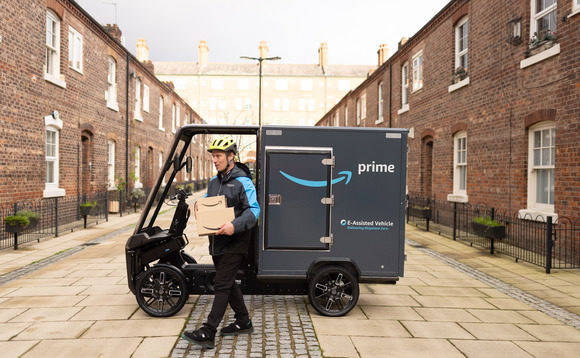First in line: ‘Clear pathway’ for UK to lead on sustainable e-commerce, report claims
New study suggests maturity of UK e-commerce sector leaves it well placed to slash carbon impact of online retail and delivery
The UK’s “high e-commerce maturity” means it has a potentially crucial role to play in the transition towards a more sustainable online retail sector, according to a new analysis published today.
Commissioned by Amazon and carried out by consultancy Oliver Wyman, the study found that the UK’s booming e-commerce market has the scope to reduce its emissions by 29 per cent before 2030 and 55 per cent beyond 2040 through the adoption of new operating models and the continued decarbonisation of energy and transport infrastructure.
According to the report, 27 per cent of the UK’s total retail sales come from e-commerce versus a Western European average of 16 per cent. Yet as things stand only 29 per cent of customers consider the environmental impact of their purchases – the second lowest score among the countries surveyed after Spain at 24 per cent.
Moreover, 27 per cent of UK customers in large cities use a car to reach out-of-home delivery points versus between 11 and 15 per cent in other countries.
However, the survey also revealed an appetite among consumers for delivery practices that can help to curb emissions. Nearly nine out of 10 respondents to the survey said they were keen to change their habits if this can reduce their environmental impact, while 29 per cent of UK customers said they already prefer to group their orders to help curb emissions. However, they are less willing to accept delays than most other Europeans: only seven per cent of respondents, versus the six-country average of 17 per cent.
Alister French, retail and consumer goods partner at Oliver Wyman, said the report revealed how collaborative action between retailers, delivery companies, policymakers, and consumers will be needed to maximise emissions reductions across the sector and enable a more sustainable e-commerce industry.
“The UK’s high e-commerce maturity makes it an important player in this effort, with opportunities to improve the environmental impact of online shopping and delivery,” he added.
“With more than a quarter of its retail sales coming from e-commerce, the UK has a clear pathway to lead the way in sustainable e-commerce practices.”
The report’s also compared the CO2 emissions of different delivery models, concluding that fast, standard, home and out-of-home deliveries for products stored in a warehouse located in the country of consumption at the time of the purchase generated similar levels of CO2 emissions.
In contrast, delivery of products shipped from abroad – or in the country of consumption but not stored in a national warehouse – were found to be less efficient from an environmental standpoint.
The emissions of “next day” deliveries were also revealed to be similar to standard deliveries in large cities, but 24 to 48-hour delivery generated 20 to 30 per cent more emissions in medium-sized cities and other areas.
Ultimately, the report suggested the best way to minimise emissions per parcel is to optimise last-mile delivery services, rather than reduce the speed of delivery. It argued that using the largest possible vehicles in the linehaul and maximising their loads can deliver significant emissions savings. Taken in conjunction with the roll out of zero emission vehicles and cleaner energy sources this approach has the potential to deliver deep emissions reductions even as the industry continues to grow.
Why not check out the article we shared about, Sainsbury’s Electrical Fleet.
Source: https://www.businessgreen.com/

